
Girl Scout Troop 2459 Tackled Trash at Dyke Marsh
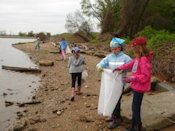 Ten enthusiastic Girl Scouts from Troop 2459 visited the Dyke Marsh Wildlife Preserve on April 28, 2015 and cleaned up trash along the shoreline. They are working on an animal habitat badge. Their
Ten enthusiastic Girl Scouts from Troop 2459 visited the Dyke Marsh Wildlife Preserve on April 28, 2015 and cleaned up trash along the shoreline. They are working on an animal habitat badge. Their 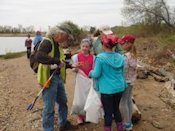 troop leader is Sarah Olson and they are based at Fort Hunt Elementary School in the Mount Vernon area. FODM President Glenda Booth, Vice President Ned Stone and FODMer Patty McCarthy talked about the harm of trash on wildlife and habitat.
troop leader is Sarah Olson and they are based at Fort Hunt Elementary School in the Mount Vernon area. FODM President Glenda Booth, Vice President Ned Stone and FODMer Patty McCarthy talked about the harm of trash on wildlife and habitat.
FODM Participated in Gum Springs Community Day
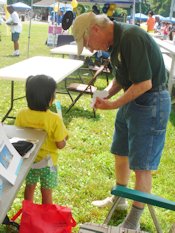 FODM Vice-President Ned Stone helps a youngster make a bird.On June 20, 2015, the Friends of Dyke Marsh spread the news about the Dyke Marsh Wildlife Preserve to new friends and old at the annual Gum Springs Community Day. Gum Springs is a historic community in the Mount Vernon area of Fairfax County founded by West Ford, a freed slave, in 1833.
FODM Vice-President Ned Stone helps a youngster make a bird.On June 20, 2015, the Friends of Dyke Marsh spread the news about the Dyke Marsh Wildlife Preserve to new friends and old at the annual Gum Springs Community Day. Gum Springs is a historic community in the Mount Vernon area of Fairfax County founded by West Ford, a freed slave, in 1833.
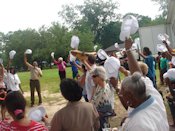 FODMers joined others in a "hats off" salute to the Fairfax County Police.
FODMers joined others in a "hats off" salute to the Fairfax County Police.
International Students Visit Dyke Marsh
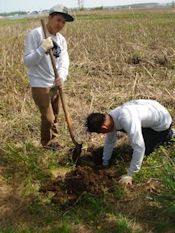 Students dug holes and planted new native plants. Photo by Glenda Booth.Biology students from the T. C. Williams High School International Academy visited the Dyke Marsh Wildlife Preserve on April 25, 2015 to learn about native and non-native plants. They planted native wetland-friendly plants along the trail between the “dogleg” and the boardwalk. The students are from all over the world.
Students dug holes and planted new native plants. Photo by Glenda Booth.Biology students from the T. C. Williams High School International Academy visited the Dyke Marsh Wildlife Preserve on April 25, 2015 to learn about native and non-native plants. They planted native wetland-friendly plants along the trail between the “dogleg” and the boardwalk. The students are from all over the world.
Thank you, T. C. Williams students! You are a great group. Come back soon!
Ned Stone Is Recognized
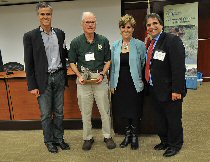 Ned Stone receives the Potomac Champion Award. Photo: Alice Ferguson Foundation.FODM Vice President Ned Stone received the Potomac Champion Award at the Alice Ferguson Foundation's 8th Annual Trash Summit on October 18, 2013. Lori Arguellles, Executive Director of the foundation, lauded Ned's untiring efforts to remove trash from the Potomac River and the Dyke Marsh Wildlife Preserve. “Whether he's cruising along Belle Haven Marina in his kayak with DC Surfriders or making upgrades to the Dyke Marsh Wildlife Preserve, he graciously works to mold a future generation of environmental stewards,” she commented. She also cited Ned's work to control invasive plants and lead nature walks.
Ned Stone receives the Potomac Champion Award. Photo: Alice Ferguson Foundation.FODM Vice President Ned Stone received the Potomac Champion Award at the Alice Ferguson Foundation's 8th Annual Trash Summit on October 18, 2013. Lori Arguellles, Executive Director of the foundation, lauded Ned's untiring efforts to remove trash from the Potomac River and the Dyke Marsh Wildlife Preserve. “Whether he's cruising along Belle Haven Marina in his kayak with DC Surfriders or making upgrades to the Dyke Marsh Wildlife Preserve, he graciously works to mold a future generation of environmental stewards,” she commented. She also cited Ned's work to control invasive plants and lead nature walks.
The Trash Summit is a forum of elected officials, government agencies, non-governmental organizations, businesses and citizens gather to develop approaches to reduce litter and waste in the Potomac watershed.
Congratulations Ned!
New Bulletin Board and Bicycle Racks Installed on Haul Road
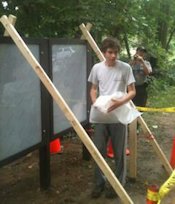 Carson Cameron at the newly installed bulletin bd. Photo by Scott Cameron.On August 9, 2014, Carson Cameron and his Boy Scout Troop 1509 colleagues installed a new bulletin board and bicycle racks at the Haul Road entrance as an Eagle Scout Service Project. Carson organized 16 boys and adults who worked diligently from 8 a.m. to 2:00 p.m. FODM thanks Carson, his helpers and the National Park Service for the new bulletin board.
Carson Cameron at the newly installed bulletin bd. Photo by Scott Cameron.On August 9, 2014, Carson Cameron and his Boy Scout Troop 1509 colleagues installed a new bulletin board and bicycle racks at the Haul Road entrance as an Eagle Scout Service Project. Carson organized 16 boys and adults who worked diligently from 8 a.m. to 2:00 p.m. FODM thanks Carson, his helpers and the National Park Service for the new bulletin board.
Belleview Elementary Students Learn All About Dyke Marsh
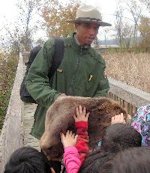 Sixty Belleview Elementary School students, teachers and parents visited the Dyke Marsh Wildlife Preserve on a blustery November 4 to learn how animals and plants in the wetland ecosystem are preparing for winter. National Park Service rangers Emily Zivot and Miguel Roberson led the walk. FODM President Glenda Booth attended the walk and provided the following photo essay.
Sixty Belleview Elementary School students, teachers and parents visited the Dyke Marsh Wildlife Preserve on a blustery November 4 to learn how animals and plants in the wetland ecosystem are preparing for winter. National Park Service rangers Emily Zivot and Miguel Roberson led the walk. FODM President Glenda Booth attended the walk and provided the following photo essay.
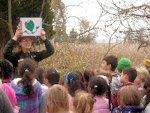 Standing on the wooden bridge, Ranger Emily Zivot told the youngsters that the “sad looking plants” caked in mud and disappearing into the muck are spatterdock, a common wetland plant.
Standing on the wooden bridge, Ranger Emily Zivot told the youngsters that the “sad looking plants” caked in mud and disappearing into the muck are spatterdock, a common wetland plant.
Ranger Miguel Roberson let the students feel a beaver pelt and explained that beavers live in Dyke Marsh (photo at top).
FODM Presents Dyke Marsh Photo to Senator Tim Kaine
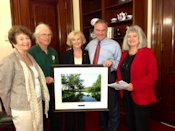 FODM presented pictures of the Dyke Marsh Wildlife Preserve to our federal elected officials, in appreciation of their support of our efforts and the preserve: Senators Mark Warner and Jim Webb and Congressmen Jim Moran, Gerry Connolly and John Dingell. On August 1, FODMers Glenda Booth, Ned Stone, Trudi Hahn and Dorothy McManus met with Senator Tim Kaine and gave him a photograph of the marsh, taken by Ned Stone.
FODM presented pictures of the Dyke Marsh Wildlife Preserve to our federal elected officials, in appreciation of their support of our efforts and the preserve: Senators Mark Warner and Jim Webb and Congressmen Jim Moran, Gerry Connolly and John Dingell. On August 1, FODMers Glenda Booth, Ned Stone, Trudi Hahn and Dorothy McManus met with Senator Tim Kaine and gave him a photograph of the marsh, taken by Ned Stone.
New Buoys Mark River Boundaries
By Erik Oberg, Biologist, NPS
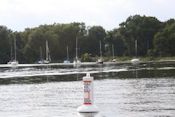 Buoy at the Belle Haven Marina. Photo by NPS.On September 27, NPS's Natural Resources and Lands staff marked Dyke Marsh's federal boundary in the Potomac River with 11 buoys. This marks the end of four years of work to secure the approvals, permits and funding to help visitors see and understand the full extent of Dyke Marsh and how much land has eroded since the NPS began managing the marsh.
Buoy at the Belle Haven Marina. Photo by NPS.On September 27, NPS's Natural Resources and Lands staff marked Dyke Marsh's federal boundary in the Potomac River with 11 buoys. This marks the end of four years of work to secure the approvals, permits and funding to help visitors see and understand the full extent of Dyke Marsh and how much land has eroded since the NPS began managing the marsh.
Working as a team, park staff safely moved and set over 3,300 pounds of concrete anchors, buoys and chain. With excellent satellite reception, anchors were placed within 17 inches of the target for every location. Each anchor was given enough chain to allow for site-specific water depth, anchor sinkage, tide and peak flood variation.
In addition to placing all 11 boundary buoys, NPS staff also gave assistance to U.S. Geological Survey researchers by extracting three soil cores from the marsh. These cores will be analyzed to provide a millennium-scale climate record of the region and supplement a new joint publication.


AlbertHerring-b4cc6b5cfb.jpg)



 Friends of Dyke Marsh, Inc. is a non-profit 501(c)(3) organization.
Friends of Dyke Marsh, Inc. is a non-profit 501(c)(3) organization.